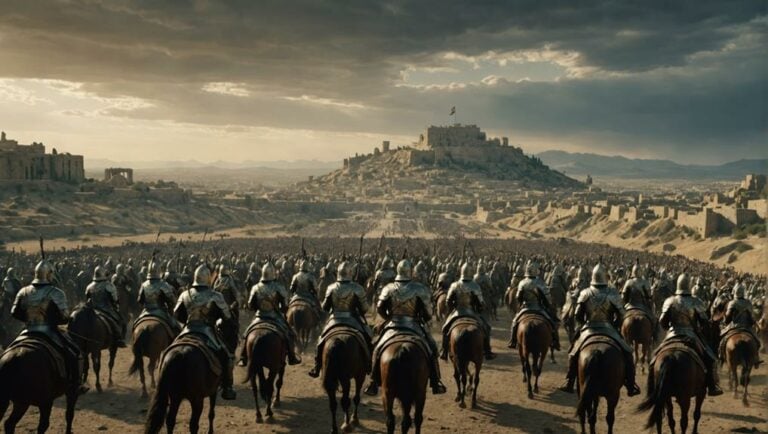Dive into the meteoric rise of Alexander the Great, whose unparalleled military prowess and strategic brilliance reshaped history.
From revolutionary battlefield tactics to cultural integration, discover how this legendary conqueror unified Greek city-states and left an indelible legacy.
Early Life and Rise
Born in 356 B.C. in Pella to King Philip II and Queen Olympias, Alexander the Great's early life was marked by a royal education and rigorous military training under Aristotle's mentorship. You can see how this unique combination of intellectual and tactical guidance shaped his future.
Aristotle's teachings not only broadened Alexander's knowledge but also instilled critical thinking and strategic planning skills essential for leadership.
King Philip II's influence was equally significant. Under his father's watchful eye, Alexander began his military training, learning the intricacies of warfare and statecraft.
This early exposure to military tactics and leadership prepared him for the responsibilities he'd later inherit. By demonstrating exceptional skills, such as taming the famous horse Bucephalus, Alexander gained valuable court exposure and the admiration of his peers.
After King Philip II's assassination, Alexander ascended to the throne at the young age of 20. His rise to power was swift, and he inherited a well-trained and powerful army. This seamless handover highlighted his readiness to lead, a proof of his rigorous training and education.
Alexander's early life laid the foundation for his legendary conquests and enduring legacy.
Macedonian Empire Formation
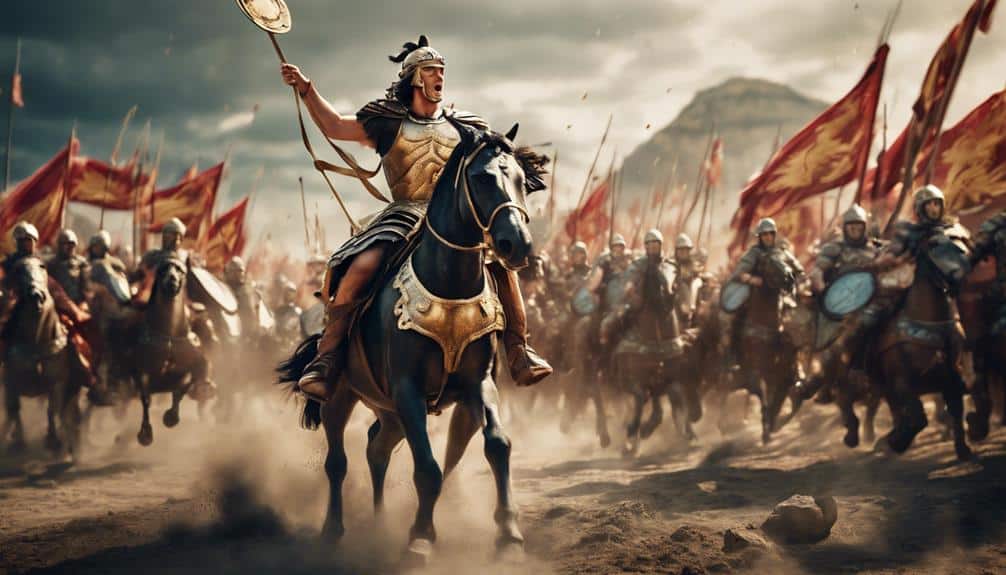
You can see how Alexander the Great's unification of the Greek city-states laid the foundation for his expansive Macedonian Empire.
By leveraging tactical military innovations and forming strategic cultural integrations, he solidified control over a vast and diverse range of territories.
This combination of military prowess and cultural diplomacy enabled the rapid expansion and consolidation of his empire.
Unification of Greek City-States
Alexander the Great's integration of the Greek city-states under his rule after rising to the Macedonian throne was a pivotal moment that reshaped ancient Greek history and laid the groundwork for the expansive Macedonian Empire. Through his conquests, Alexander effectively consolidated the fragmented Greek city-states, ending their prolonged internal conflicts.
This integration wasn't merely a military achievement; it was a strategic maneuver that integrated these territories into a cohesive administrative framework. By incorporating the conquered Greek city-states into his administration, Alexander solidified his control and secured the stability of his growing empire.
The integration marked a significant turning point, transforming the political landscape of ancient Greece. The once independent and often rivalrous city-states, such as Athens, Sparta, and Thebes, were now part of a larger, more powerful entity under Macedonian hegemony.
Alexander's leadership and diplomatic strategies further strengthened this integration. His ability to manage and integrate diverse regions showcased his exceptional statesmanship. The integration of the Greek city-states not only facilitated the expansion of the Macedonian Empire but also promoted cultural and economic exchanges that would influence the ancient world for centuries.
Tactical Military Innovations
The Macedonian phalanx formation, characterized by soldiers forging a tight, impenetrable unit with long spears, revolutionized battlefield tactics and greatly contributed to the formation of the Macedonian Empire. By employing this military tactic, Alexander the Great's army created a formidable wall of shields and sarrissa spears, making it nearly impossible for opponents to break through. This method allowed for a strong offensive push while maintaining robust defense.
The primary unit in this formation was the syntagma, a tight grid of soldiers that maximized coordination and defensive capability. Armed with the sarrissa spear, a weapon significantly longer than those used by their adversaries, Macedonian soldiers gained a substantial reach advantage. This extended reach enabled them to strike opponents from a distance, often neutralizing threats before they could close in.
The phalanx formation also provided tactical flexibility. Alexander's forces could adapt to various battlefield conditions, outmaneuvering and intimidating their enemies. This adaptability proved vital in numerous victories, showcasing the effectiveness of these innovative military tactics.
Strategic Cultural Integration
Often overlooked in discussions of his military prowess is Alexander the Great's strategic approach to cultural integration, which played a pivotal role in the successful management and expansion of his vast empire. By adopting Persian customs and encouraging strategic marriages, Alexander fostered unity among his diverse subjects.
His mass weddings, where Macedonian soldiers married local women, symbolized this blend of cultures and helped solidify loyalty.
Unlike many conquerors who imposed their own culture, Alexander promoted acceptance and integration of local traditions. This inclusive policy was key to maintaining control over territories stretching from the Balkans to the Indus Valley.
By embracing the customs of the conquered peoples, he reduced resistance and fostered a sense of belonging among his new subjects.
Alexander's focus on cultural integration rather than imposition allowed him to manage a vast empire with varied languages and customs effectively. His governance strategy, emphasizing adaptation and inclusivity, not only secured smooth administration but also left a lasting legacy.
This approach in both military strategy and cultural integration highlights why Alexander the Great remains a pivotal figure in history, demonstrating that true conquest goes beyond mere battlefield victories.
Conquest of Persia
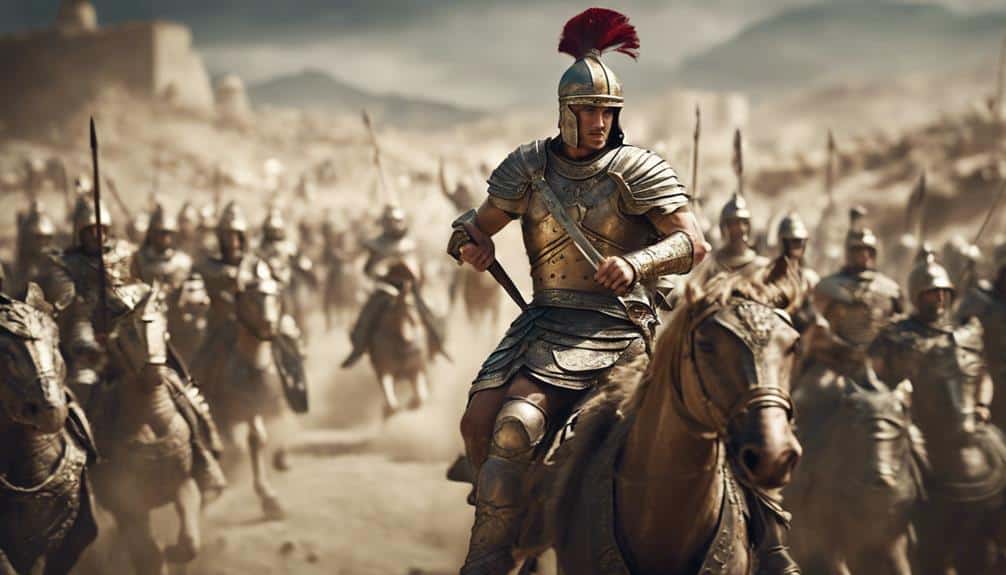
In analyzing Alexander's conquest of Persia, you'll notice his strategic victories at the Battle of Issus and the Siege of Tyre were pivotal.
These actions culminated in the fall of Persepolis, effectively dismantling the Persian Empire.
Alexander's military tactics and relentless pursuit of dominance underscore his success in this campaign.
Battle of Issus
Alexander's triumph at the Battle of Issus in 333 BC showcased his army's superior tactics and marked a pivotal moment in his campaign against the Persian Empire. Despite being vastly outnumbered, Alexander the Great's forces managed to outmaneuver the Persian army. This was achieved through the strategic deployment of his phalanx and cavalry, which effectively exploited the terrain and disrupted the enemy's formations.
The battle forced Darius III, the Persian king, to flee the battlefield in haste, abandoning his family and treasures. This retreat not only indicated a critical collapse in Persian morale but also symbolized the vulnerability of the once-mighty Persian Empire. By capturing Darius's family, Alexander secured a valuable bargaining chip and further solidified his reputation as a formidable military leader.
Moreover, the victory at Issus solidified Alexander's control over Asia Minor, establishing a strong foothold for further advances into Persian territory. This battle underscored the tactical brilliance and relentless ambition that characterized Alexander's military campaigns.
As you delve into his subsequent conquests, you'll see how this victory set the stage for the eventual overthrow of the Persian Empire and the expansion of Alexander's empire into new and uncharted territories.
Siege of Tyre
Following his decisive victory at Issus, Alexander the Great set his sights on the island city of Tyre, a strategically vital and well-fortified bastion that posed a notable challenge in his quest to dismantle the Persian Empire. Tyre's formidable defenses and strategic location made it an essential target for the Kingdom of Macedonia. To conquer this stronghold, Alexander employed innovative tactics that showcased his military genius.
One of his key strategies involved constructing a causeway, an engineering feat achieved by using rubble and debris to bridge the gap between the mainland and the island. This allowed his army to move siege equipment closer to Tyre's walls. Naval warfare also played a pivotal role in the siege. Alexander's fleet effectively blockaded the city, cutting off supplies and reinforcements. This naval blockade was instrumental in weakening Tyre's defenses over the seven-month siege, which lasted from January to July 332 BC.
Ultimately, the fall of Tyre marked a significant victory for Alexander, demonstrating his determination and strategic prowess. This conquest not only solidified his control over the Eastern Mediterranean but also further weakened the Persian Empire's hold on the region.
Fall of Persepolis
How did Alexander the Great's strategic acumen culminate in the monumental conquest of Persepolis, the heart of the Persian Empire, in 330 BC?
Alexander's meticulous planning and military prowess led to this pivotal victory. By strategically outmaneuvering Persian forces, he guaranteed a decisive blow that reverberated through history.
The fall of Persepolis wasn't just a military triumph; it symbolized the end of Persian resistance and the beginning of a new era under Macedonian rule.
Persepolis, known for its opulence and grandeur, represented the cultural and political zenith of the Persian Empire. Its conquest wasn't just about defeating an enemy but also about dismantling a symbol of Persian power.
Alexander's forces, through a combination of tactical brilliance and relentless assault, overwhelmed the city's defenses, showcasing their superior combat skills and strategic insight.
This victory solidified Alexander's control over the Persian Empire, expanding his conquests and endeavors echoed throughout history. By capturing Persepolis, Alexander demonstrated his ability to conquer and integrate vast territories.
The fall of Persepolis stands as a tribute to his strategic genius and military prowess, marking a turning point that reshaped the ancient world.
Battle of Issus
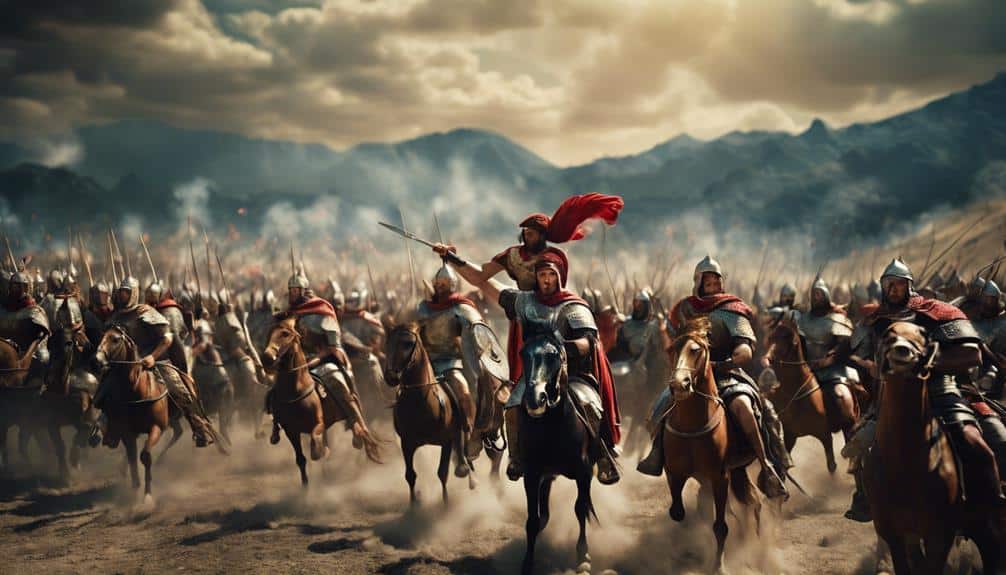
The Battle of Issus in 333 BC stands as a proof to strategic ingenuity and the transformative impact of leadership in warfare. In Alexander the Great's epic campaign, this battle showcased his tactical brilliance and underscored his reputation as an unstoppable military force. Despite being outnumbered by the Persian Empire led by King Darius III, Alexander's strategic acumen led to a decisive victory.
You can see Alexander's genius in the way he utilized the terrain to his advantage. The narrow coastal plain of Issus neutralized the numerical superiority of the Persians, allowing Alexander's phalanx formation to hold firm against the larger enemy forces. His cavalry, led by himself, executed a flanking maneuver that shattered the Persian lines, causing chaos and disarray.
The aftermath of the Battle of Issus had profound implications. Alexander captured Darius III's family, treasury, and camp, significantly weakening the Persian Empire's morale and resources. This victory didn't just mark a turning point in Alexander's campaign; it paved the way for his further conquests into Egypt and Mesopotamia, laying the groundwork for his continued success.
Alexander's tactics at Issus remain a tribute to his exceptional military leadership.
Siege of Tyre
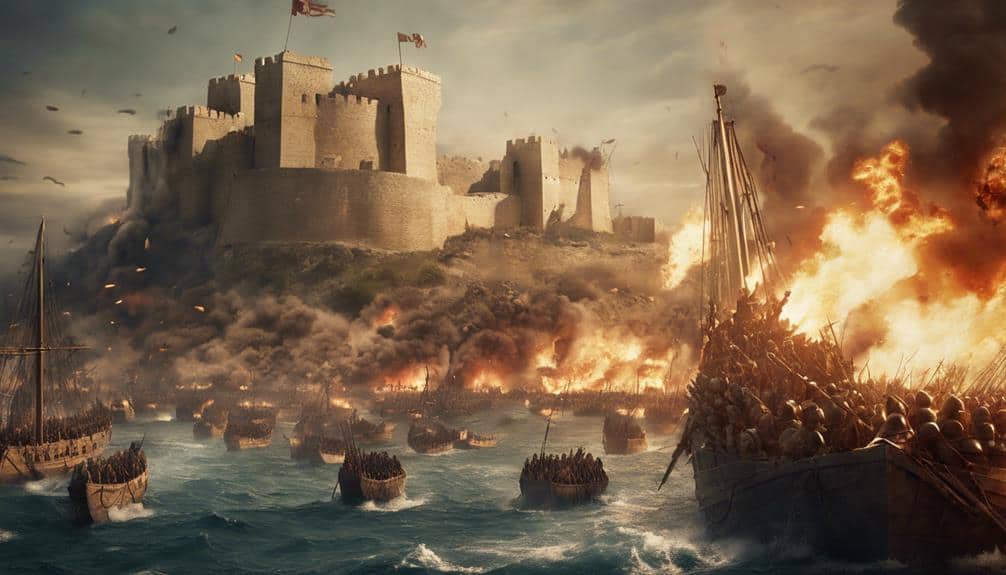
Alexander the Great's Siege of Tyre in 332 BC exemplifies his relentless determination and innovative military strategy. Tyre was a well-fortified island city, renowned for its naval power and robust defenses, making it a formidable challenge. Alexander recognized that traditional siege tactics wouldn't suffice. Instead, he demonstrated remarkable ingenuity by constructing a causeway from the mainland to the island, a project requiring immense labor and resources over seven grueling months.
During this protracted siege, the naval battle emerged as a critical component. Tyre's strong fleet initially posed a significant obstacle, but Alexander's strategic acumen turned the tide. He assembled a diverse coalition of ships from his allies, effectively countering the Tyrian navy. This allowed him to launch coordinated assaults on the city walls, weakening Tyre's defenses over time.
The eventual fall of Tyre was a landmark victory for Alexander the Great. It wasn't just a reflection of his military prowess but also of his ability to adapt and innovate under pressure. By overcoming a seemingly impregnable city through sheer determination and tactical brilliance, Alexander solidified his reputation as one of history's greatest military leaders.
Expansion Into Egypt
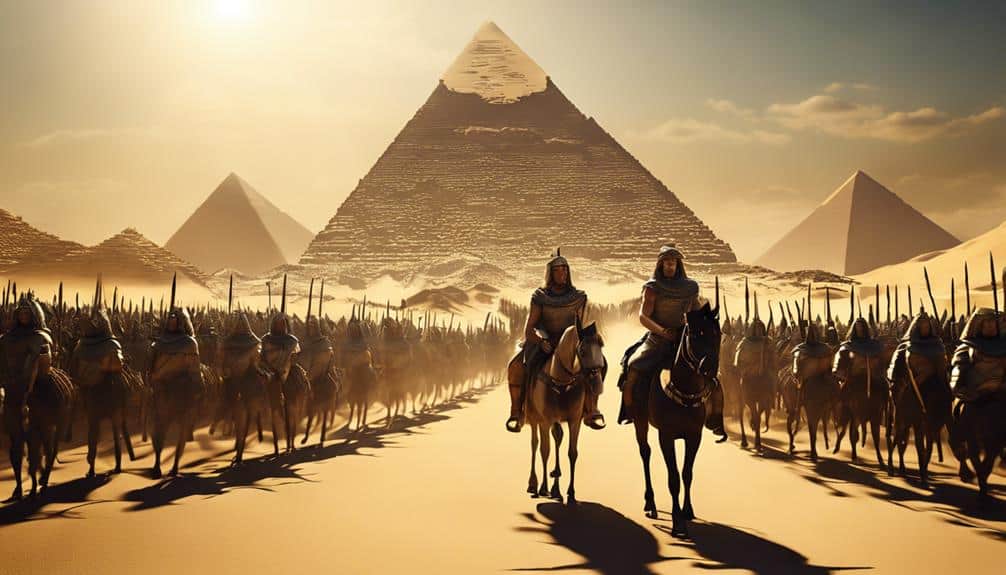
In 332 BC, when Alexander the Great turned his attention to Egypt, he was welcomed as a liberator from Persian rule, illustrating his ability to win both hearts and territory. His entry into Egypt wasn't marked by conflict but by celebration. The Egyptians, oppressed under Persian dominance, saw Alexander as a savior.
Once in Egypt, Alexander founded the city of Alexandria, which quickly became a major center of Hellenistic culture and learning. This strategic move highlighted his vision for a unified empire enriched by diverse cultures. Alexandria's establishment served multiple purposes:
- Cultural Integration: Alexandria became a melting pot of Greek and Egyptian traditions, promoting mutual respect and collaboration.
- Economic Hub: The city's prime location bolstered trade and commerce, enhancing the economic strength of Alexander's empire.
- Intellectual Center: Alexandria's libraries and schools attracted scholars, ensuring the preservation and propagation of knowledge.
Moreover, the Oracle of Siwa declared Alexander the son of the Egyptian god Amun, solidifying his divine status among the Egyptians. This divine endorsement further strengthened his rule.
Gaugamela Victory
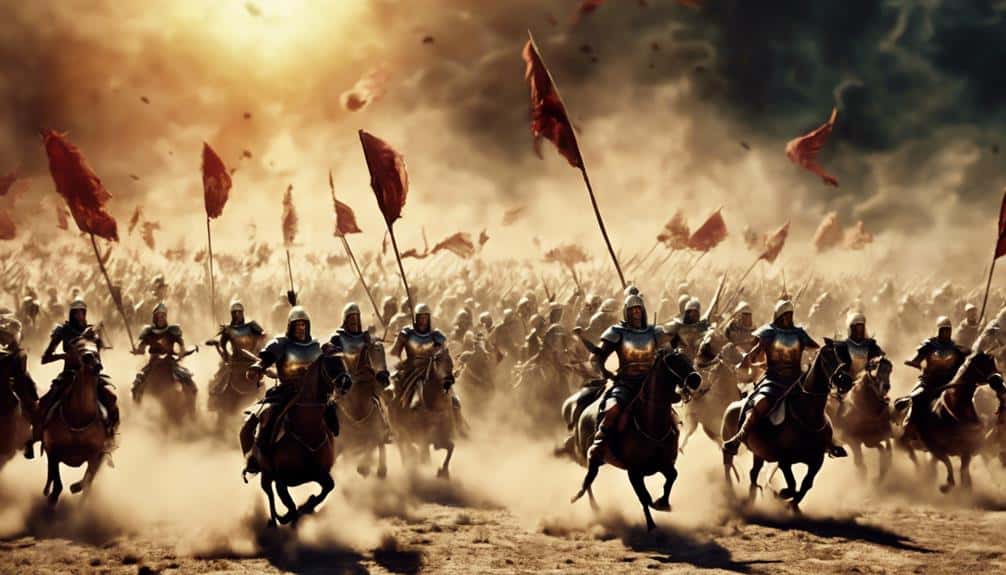
Despite being heavily outnumbered, Alexander's troops utilized superior military tactics at the Battle of Gaugamela in 331 BC, securing a pivotal triumph over the Persian Empire led by King Darius III. This Gaugamela victory was a testament to Alexander's strategic brilliance. He expertly employed the phalanx formation, a dense grouping of infantry armed with long spears, to create an impenetrable front line against the more numerous Persian forces.
In addition to the phalanx, Alexander skillfully orchestrated cavalry charges and flanking maneuvers to exploit weaknesses in Darius III's army. His cavalry, led by the elite Companion Cavalry, executed precise charges that disrupted the Persian ranks.
Meanwhile, Alexander's flanking maneuvers, where troops attacked the enemy from the sides, caused further disarray and confusion among the Persians.
Alexander's ability to adapt and respond swiftly to battlefield developments was vital in overwhelming the Persian forces. This decisive victory not only marked the downfall of Darius III and the Achaemenid Dynasty but also solidified Alexander's reputation as a brilliant military leader.
The Gaugamela victory expanded his empire significantly, paving the way for further conquests.
India Campaign

Setting off on the India campaign in 326 BC, Alexander's forces encountered formidable opposition from regional rulers, most prominently King Porus at the Battle of the Hydaspes River. This battle was a defining moment where Alexander showcased his tactical brilliance. Despite facing an army equipped with war elephants and a challenging monsoon season, Alexander demonstrated adaptability and strategic ingenuity, ultimately securing victory.
In analyzing the Battle of the Hydaspes River, consider these pivotal elements:
- Terrain Utilization: Alexander cleverly used the river's terrain to outmaneuver Porus' forces, conducting a surprise flanking maneuver.
- Diverse Tactics: He employed a mix of cavalry, infantry, and archers to counter the war elephants, causing disarray in Porus' ranks.
- Leadership: Alexander's personal leadership and presence on the battlefield inspired his troops, maintaining high morale despite adverse conditions.
However, the India campaign wasn't without its challenges. By the time Alexander's forces reached the Beas River, his soldiers were exhausted and homesick. They refused to march further into the Indian subcontinent, forcing Alexander to commence the return journey.
Although he didn't fully conquer India, his campaign significantly influenced the region's subsequent history and military tactics.
Cultural Legacy
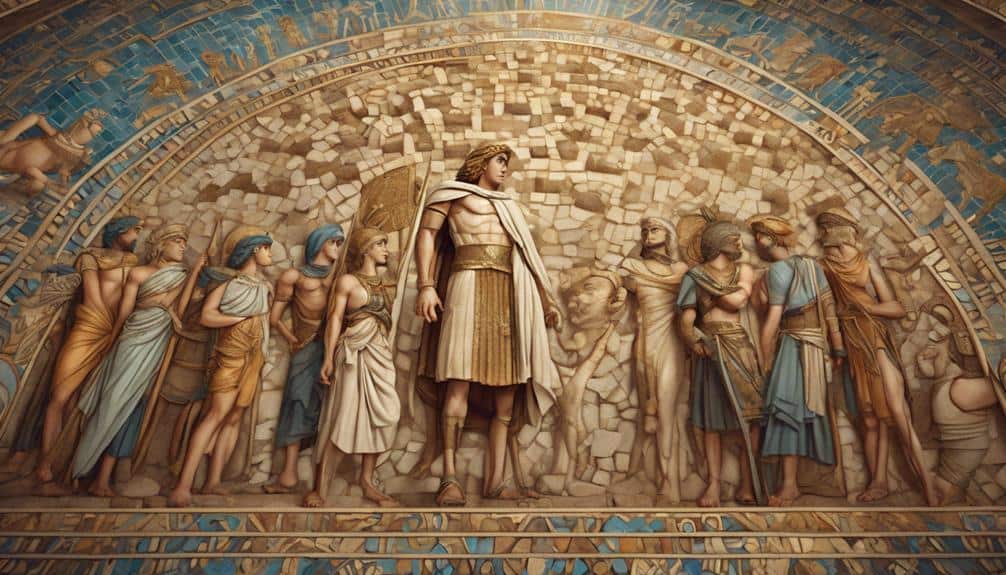
The India campaign's challenges and achievements laid the groundwork for Alexander the Great's profound cultural legacy that reshaped the ancient world. Through his conquests, Alexander didn't just expand his empire geographically; he also facilitated the spread of Greek culture, language, and customs across vast territories. By founding numerous cities named after himself, he actively promoted Hellenistic culture, creating hubs where Greek and local traditions could blend seamlessly.
This blending of cultures during the Hellenistic Era wasn't just superficial. It encouraged robust artistic, literary, and philosophical exchanges that enriched the societies within his empire. The cross-pollination of ideas led to advancements in various fields and a more interconnected world.
Additionally, Alexander's deliberate promotion of cultural integration set a precedent for future conquerors and leaders, who adopted similar strategies to manage and unify their diverse domains.
His legacy as a cultural influencer continues to be a subject of study, highlighting its lasting impact on art, literature, philosophy, and global cultural exchange. Understanding Alexander's cultural legacy offers insight into how he managed to create a lasting influence that transcended his military achievements, reshaping the ancient world in profound ways.


